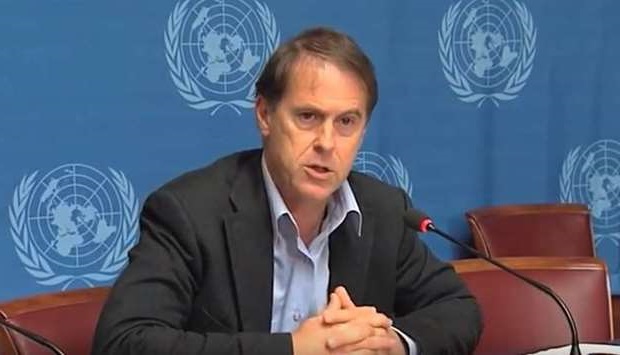Rubert Colville , Spokesperson for the UN High Commissioner for Human Rights
Despite the fragile ceasefire in northeastern Syria, we are concerned by two worrying developments and their direct impact on civilians. Firstly, we note a spike in what appears to be an indiscriminate use of attacks IEDs (improvised explosive devices) in residential neighborhoods and local markets.
These attacks have mainly been carried out in areas under the control of Turkish forces and affiliated armed groups and, to a lesser extent in areas under the control of Kurdish armed groups in northern and north-eastern Syria. And in areas within the “de-escalation zone” in Idlib and parts of Aleppo, we have seen another upsurge of military operations after a relative lull in hostilities in October.
We are gravely concerned by the increased use of IEDs in populated areas. Such use may amount to an indiscriminate attack, a serious violation of international humanitarian law and constitutes a war crime. Since the ceasefire agreement of 22 October, we have recorded a rise in the number of attacks with IEDs, including with vehicle-borne improvised explosive devices (VBIEDs), in populated areas including residential neighbourhoods and inside at least 12 busy markets and commercial areas in Al-Hassakeh, Ar-Raqqa and Aleppo.
Incidents we have verified indicate there were at least 49 attacks with various types of IEDs between 22 October and 3 December of which 43 were recorded in areas under the control of Turkish forces and affiliated armed groups. As a result of these attacks, we have recorded at least 78 civilian deaths (including 53 men, seven women and 18 children) and 307 injuries. Seventy-two of the deaths and 258 of the injuries occurred in areas under the control of Turkish forces and affiliated armed groups.
Last week, on 26 November, at least 12 civilians including eight men, two women and two boys were killed as a result of what was alleged to be a VBIED that detonated in a residential area in the town of Tel Halaf in rural Ras al-Ain area in al-Hassakeh. On the same day, six civilians including four men and two boys, were killed when a VBIED detonated near a fuel station in the al-Sina’a neighborhood in the city of Tel Abyad in northern Ar-Raqqa.
We are also concerned by the continued military operations in the ‘de-escalation zone’ of Idlib. Airstrikes and ground-based strikes by Government forces and their allies have continued to hit areas under the control of non-State armed actors in Idlib and Aleppo and result in civilian casualties. Non-State armed groups, on their part, have recently escalated attacks on Government controlled areas including in southern Idlib, northern Hama, and Aleppo city. On 21 November, seven civilians were killed and at least 29 civilians injured as a result of what were alleged to be ground-based strikes by non-State armed groups that hit several neighbourhoods in the city of Aleppo.
Despite the ceasefire, intermittent fighting continues to be reported in northeast Syria. On 2 December alone, 10 civilians, including eight boys, were killed and 12 civilians, including two women and seven boys, injured as a result of what were alleged to be ground-based strikes by Turkish affiliated armed groups that hit near a school in a residential neighborhood in the city of Tel Rif’at in northern rural Aleppo. All casualties were internally displaced civilians from Afrin district in northwestern Aleppo and the children killed and injured were 3 – 15 years old.
In the deadliest incidents in Idlib, 10 civilians were killed when a market in the city of Maarat An Numan was hit by an alleged air-strike on 2 December. On the same day, several strikes also hit the Idlib Central Prison, killing at least five people, including a civilian woman and her two children who were visiting an imprisoned family member. The same prison was repeatedly hit before, including on 13 March.
All parties to the conflict must immediately cease and refrain from directing attacks against civilians and civilian objects and from any indiscriminate attacks, and investigate all such incidents. States that support parties to the conflict, even when they are not directly engaged in hostilities, are obliged to respect and ensure respect for international humanitarian law, in all circumstances. We urge States to take all feasible measures to stop any violations by their allies. We remind all parties to the conflict of their responsibility to protect civilians and to comply with their obligations under international law.
ENDS
For more information and media requests, please contact: Rupert Colville – + 41 22 917 9767 / rcolville@ohchr.orgor Jeremy Laurence – + 41 22 917 9383 / jlaurence@ohchr.org
Tag and share – Twitter: @UNHumanRights and Facebook: unitednationshumanrights


